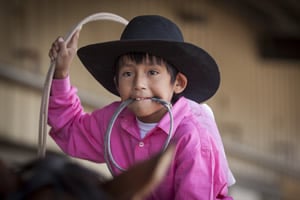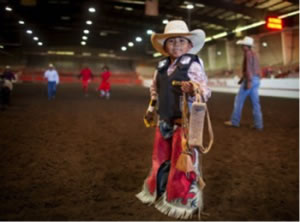World Tour Blog part 2
Nancy Bo Flood writes and teaches on the Navajo Reservation where she hikes, rides her bike and attends local rodeos. She is the author of several award-winning books including Navajo Year, Walk Through Many Seasons (Arizona Book of the Year) and Warriors in the Crossfire (Colorado Book of the Year). Recent titles include No-Name Baby (namelos, Top 100 Books of the Year, Bank Street) and her newest, already a Junior Library Guild Selection, Cowboy Up, Ride the Navajo Rodeo.
The one thing I have consistently done my whole life is read books. I wasn’t always going to rodeos and writing about them. In college I wanted to learn about the brain. How do we remember, why do we forget, why we want to try new things? Just how does our brain work? So I became a research psychologist and studied brain development, also brain disorders, at the University of Minnesota and also as a post-doctoral scientist at London University. That might seem like a long way from writing books for kids, but it’s not.
 The story I’ve recently written is Cowboy Up, Ride the Navajo Rodeo. It’s not just about rodeo, but about the Navajo kids and families that participate and compete. This was described best by a recent review in School Library Journal:
The story I’ve recently written is Cowboy Up, Ride the Navajo Rodeo. It’s not just about rodeo, but about the Navajo kids and families that participate and compete. This was described best by a recent review in School Library Journal:
The history and tradition of the Navajo rodeo are made lively and accessible in this “day-in-the-life” account. Short narrative poems accompany each spread, recounting the anticipation, determination, danger, and excitement of the day… Warm and inviting, the book gives a real sense of what it’s like to be a part of the Navajo rodeo.
A top-notch introduction to a unique event.
Maybe you wish you could have your own horse, ride like the wind, twirl a lasso and catch a run-away calf. Or maybe you are curious about what it would be like to be a cowboy or a rodeo rider.
 I wrote this book to share what it’s like to be inside a rodeo arena, getting ready to race out of a chute. We’ve all experienced the nervous “can’t sleep and can’t eat” jitters before a big event. Maybe yours was getting ready for a recital or performance, or try-outs for a team. Cowboys and cowgirls getting ready to rodeo feel the same way. It’s scary.
I wrote this book to share what it’s like to be inside a rodeo arena, getting ready to race out of a chute. We’ve all experienced the nervous “can’t sleep and can’t eat” jitters before a big event. Maybe yours was getting ready for a recital or performance, or try-outs for a team. Cowboys and cowgirls getting ready to rodeo feel the same way. It’s scary.
One great thing about this book, you don’t even have to read it, just look at the photographs. They tell a mighty fine story.
Nancy Bo Flood: When I was a kid I liked reading, for two reasons. It was one way to get away from seven brothers and sisters and chores. I would climb a tree, hide in the branches and read. The other reason is that books had pictures, especially National Geographic magazines. I’d read the descriptions under the pictures and read some of the article if I wanted to learn more.
My message: Read anything. You learn interesting stuff, meet interesting people and go places you have never been. Read every day. As a kid, I kept a stack of comic books under my bed. And a flashlight! Now I keep a stack of books next to my bed. You never know when you need a good book.
Remember that I began my career as a psychologist doing brain research? Being a scientist taught me to observe, to look more closely, to see what others might not have noticed. Everything I learned about the brain, how it works, how we work, has helped me write books.
A new book out that I think accurately shows us about being a kid whose brain works a little different is Rogue by Lyn Miller-Lachman.
In this book Lyn does not hold back any punches but with each chapter pushes the reader further along the sharp edge of suspense, wondering, who is this kid, Kiara, and what is she going to do next?
Kiara, main character, is an eighth-grade student soon to have an official diagnosis of Asperger’s syndrome, so relating to other people, especially peers, is not exactly her specialty. Most of the time the world doesn’t make sense to Kiara, but Mr. Internet does.
And then the new boy, a new neighbor, moves in across the street. The politics of friendship become complicated. Sometimes Chad is a friend. Sometimes he uses Kiara to protect his drug-distilling family. Sometimes….Kiara is not sure what Chad’s real intentions are.
After reading Rogue I asked Lyn:
Nancy: This book is somewhat autobiographical, right? What inspired you to take the risk and write it?
Lyn: My difficulties growing up were something I had avoided in my writing, preferring to write about other people’s struggles rather than my own. Perhaps I had internalized the dislike that others felt for my younger self, because every time I tried to create a character like myself, she turned out to be a complete loser.
In my first semester at Vermont College of Fine Arts, I worked with An Na and was inspired by her honesty and courage in presenting Young Ju, the semi-autobiographical immigrant protagonist of A Step from Heaven. Young Ju isn’t always likable, and she doesn’t always make good decisions, but her powerful and unique voice drew me in and made me care about her. I wanted to create a similar character in Kiara, with a voice that was completely honest and completely hers as a girl on the autism spectrum trying to figure out how the world works and the secrets of friendship that everyone except her seems to know.
I begin the novel with an incident that actually happened to me in seventh grade. I bought my lunch and set it on the table where the popular girls always sat. But before I could sit down, one of the girls, without saying a word, pushed my tray onto the floor.
All my life, I wished I could have fought back, but I had very strict parents who would have severely punished me. Kiara does what I wanted to do – she slams the tray in the girl’s face, thereby earning suspension from school for the rest of the year. Her exclusion makes it even more difficult for her to find a friend, so that when Chad and his family move in a block away, it really is her only chance.
Nancy: What would you describe is the real “heart” of the story – the emotional understanding you hope the reader will have?
Lyn: Although I wasn’t officially diagnosed with Asperger’s syndrome until adulthood, I always knew I was different from the other kids. I wanted to have friends and be part of school and social activities but grew accustomed to isolation and exclusion because of my poor social skills. I always felt I had something to contribute, if only people would pay attention to me, and at times I sought that attention in negative ways.
Like me, Kiara wants nothing more than to have a friend, but beyond that, she wants to find the “special power” that will make her a valued part of her community. For inspiration and courage, she looks to the X-Men, mutant superheroes who band together to save each other and the world from prejudice and evil. People who think and act differently because their brains are wired differently or because they have faced more challenging circumstances tend to get written off as troublemakers. But different ways of thinking may be just what’s needed to solve a difficult problem, and we as a society need to embrace those who are different and make the effort to help each person find his or her own special power.
As part of our World Tour Blog, I encourage you to take a look at Rogue, read Lyn’s up-coming World Tour Blog, and if you have the opportunity – take in a rodeo! Or read a book about one.